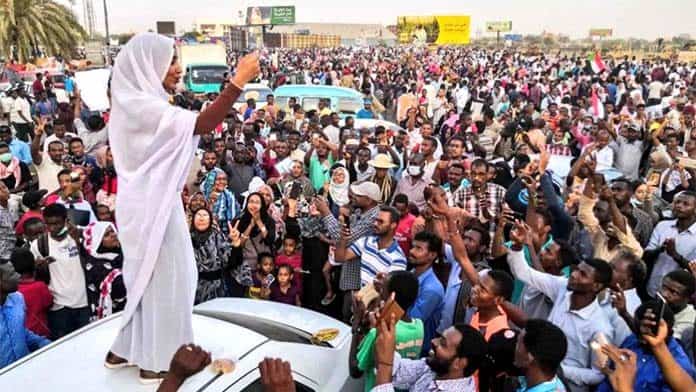Over 100 people have been murdered in a soaring wave of brutal attacks on Sudan’s revolution.
Over 700 people suffered injuries and dozens of women and men were raped as part of an assault on the sit-in outside the military headquarters in Khartoum, deployed by the paramilitary Rapid Security Forces (RFS).
Although the Transitional Military Council declared the end of negotiations with the civilian opposition, cutting off internet and phone services to disrupt ongoing protests, the latest general strike has forced the regime to backtrack.
The attack comes seven months after people in Sudan first took to the streets in December, protesting the Government’s decision to triple the cost of bread.
The regime had previously faced down mass protests in 2013 after it capitulated to pressure from IMF for debt repayments and cut subsidies, resulting in massive fuel price increases. Security forces attacked and killed 50 people in order to maintain power.
This time months of protests and strikes succeeded in ending the 30-year dictatorship of Omar Al-Bashir, who seized power in a coup in 1989.
Demonstrations first broke out in the city of Atbara and rapidly spread nation-wide in the face of a deepening economic crisis.
Sudan’s inflation rate is among the world’s highest, with the country’s economy struggling after losing 75 per cent of its oil reserves after South Sudan seceded in 2011.
In October 2018, two months before the uprising began, Al-Bashir’s government announced a major 15-month austerity plan. Sudan’s then Prime Minister Moata Moussa said the plan would include “further strict austerity measures”.
Tens of thousands have participated in a mass sit-in outside the military headquarters in Khartoum. The leading organisation in the revolution is the Sudanese Professional Association, comprised of academics, health workers, teachers and lawyers. “Resistance Committees” organised within neighbourhoods, have also been pivotal to the success of the mobilisations.
Sudanese trade unions have also played an important role from very early on. As early as December 2018, there was a nationwide work stoppage to protest the price hikes. In February, 1800 workers at Port Sudan’s southern container terminal went on strike against plans to privatise the port during a visit by the Prime Minister.
Protests have even spread to Darfur, a region marginalised by successive central governments in Khartoum following divisions established from the period of British colonial rule. Al-Bashir and the military oversaw the brutal suppression of rebellion in Darfur. The Janjaweed militia committed vast amounts of ethnic cleansing. Al-Bashir also waged a ruthless civil war against South Sudan.
Protests in Darfur in January featured banners opposing the “racist regime” and demanding “the racist system must go”. Encouragingly, protests in other parts of the country have also opposed the regime’s racism, raising chants of “we are all Darfur”.
The Rapid Security Forces were formed out of the notorious Janjaweed militias responsible for rape, torture and killing in Darfur. Mohamed Hamdan (Hemedti), the current Deputy Chairman of the current Transitional Military Council, is the former commander of the Janjaweed.
Al-Bashir’s removal from power was carefully managed by the military. He was replaced with a Transitional Military Council which has insisted on maintaining “sovereign powers” until elections are held. Revolutionaries have demanded a civilian majority on the transitional council.
In response to the military’s attempt to hold power, the popular movement escalated action. A “freedom train” brought 1000 people from Atbara to Khartoum to attend the protests at the military headquarters.
On 28 and 29 May, a general strike was declared demanding civilian rule.
Immediately before the crackdown, the military council sent Hemedti to meet with the counter-revolutionary regimes of Saudi Arabia, United Arab Emirates, and Egypt’s military dictator Al Sisi, who led the repression against Egypt’s own revolution.
Although the Transitional Military Council, backed by the ruthless Rapid Security Forces, hoped its crackdown would disperse the revolution, a new general strike was launched on 9 June.
Khartoum’s streets were deserted and shops closed. Airport workers and pilots grounded most flights, and banks, along with schools, ports and rail lines were shut.
Workers in oil fields in West Kordofan organised by the Petro Energy Workers Association also committed to stop work.
But the opposition coalition has now called off the strike in order to return to negotiations with the military. This is a mistake—the general strike actions have the potential to drive out the military and place the economy under workers’ control.
Workers’ councils based on delegates from workplaces are needed to pose an alternative to military rule, and address the severe economic crisis hitting workers and the poor.
By Jasmine Ali




